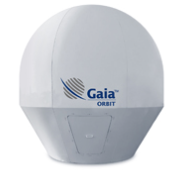
Orbit Communications Systems Ltd. announces their hearty salute to Israel’s Technion Institute of Technology on the inauguration of its first satellite ground station. The Technion’s Adelis ground station was completed by Orbit in a turnkey project integrating a 3.7-meter S-band Gaia 100 terminal with tower-mounted VHF and UHF antennas.
Prof. Pini Gurfil, Professor of Aerospace Engineering at the Technion and Director of the Asher Space Research Institute stated that they had a great working relationship with the ground station experts at Orbit (TASE: ORBI). Not only did Orbit come to the table with a lot of hands-on knowledge, Orbit was also very responsive to their evolving needs.

Maximum Performance, Minimum Footprint. The Gaia 100 family is comprised of cost-effective, high-performance ground station systems capable of capturing data from LEO and MEO satellites. Gaia 100 supports three antenna sizes: 2.4m, 3.7m and 4.5m
Orbit President and CEO, Eitan Livneh said that a key challenge of the Technion project involved making sure that both the 3.7-meter S-band terminal and smaller VHF and UHF antennas each had a clear line of sight. They resolved this issue by using an 11-meter communications tower alongside the radome. Their Gaia solution also answered the requirement that the ground station be compact and lightweight enough to be deployed on the roof of the building and be able to withstand the strong winds typical to the area.
About the Technion’s Adelis SAMSON satellite mission
Adelis SAMSON is a satellite mission led by the Asher Space Research Institute at the Technion, in collaboration with Israeli industry. The mission, which includes three nano-satellites built according to the CubeSat standard, has two goals:
- To demonstrate a long-term, autonomous cluster flight of multiple satellites, and
- To determine the position of a cooperative terrestrial emitter, based on the difference of signal arrival times.
About Orbit’s Gaia™ 100 ground stations
Gaia 100 is a small-footprint, high-performance series of remote-sensing ground stations for real-time data capture from LEO or MEO satellites. Built to withstand harsh environmental conditions, its key features include:
- Real-time data capture without any delay or reliance on third parties
- Significant cost-efficiency over legacy ground stations
- Easy installation and support for 2.4- to 4.5-meter antennas
- Compact size, light weight and operation within a ruggedized radome
- Flexible deployment, e.g., on the roof or a building, atop a rig platform or in an open field

